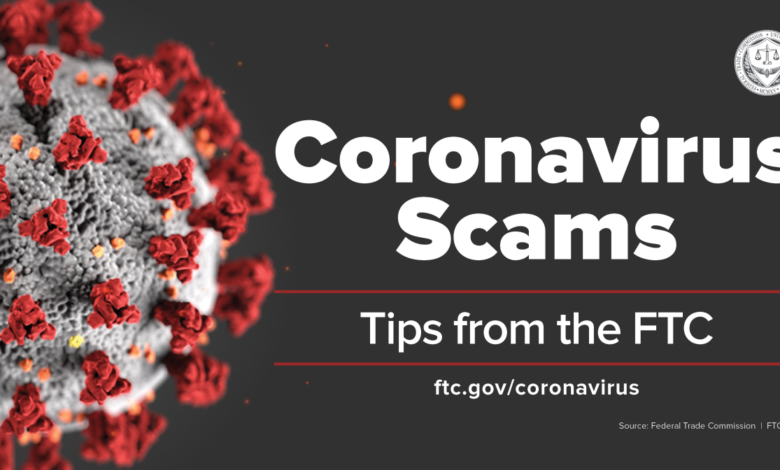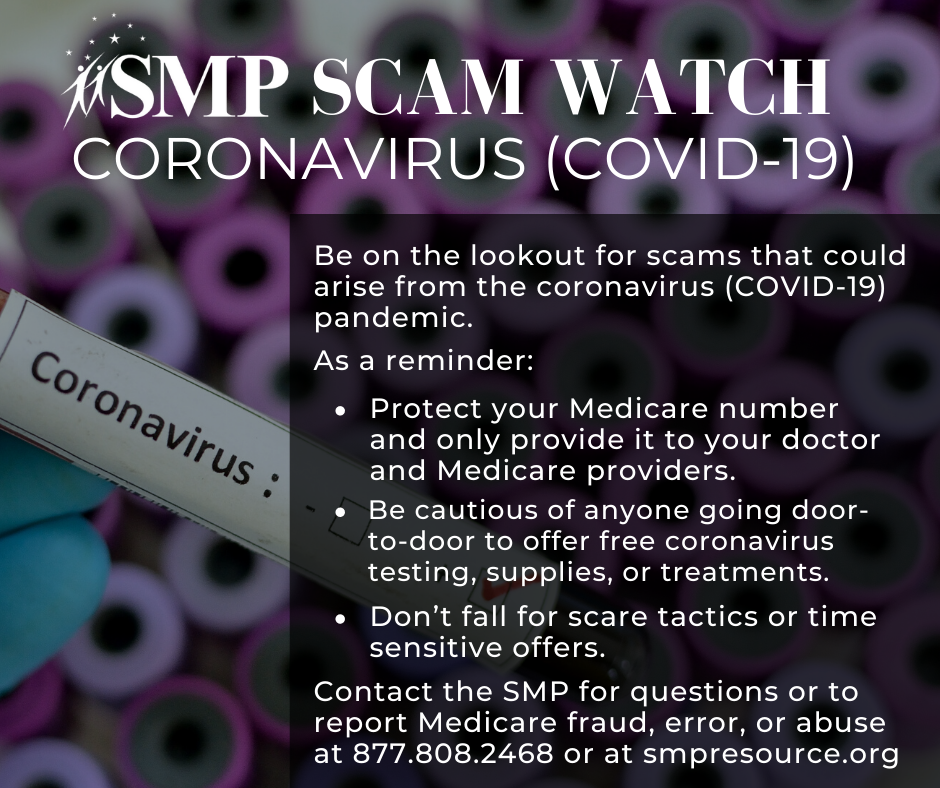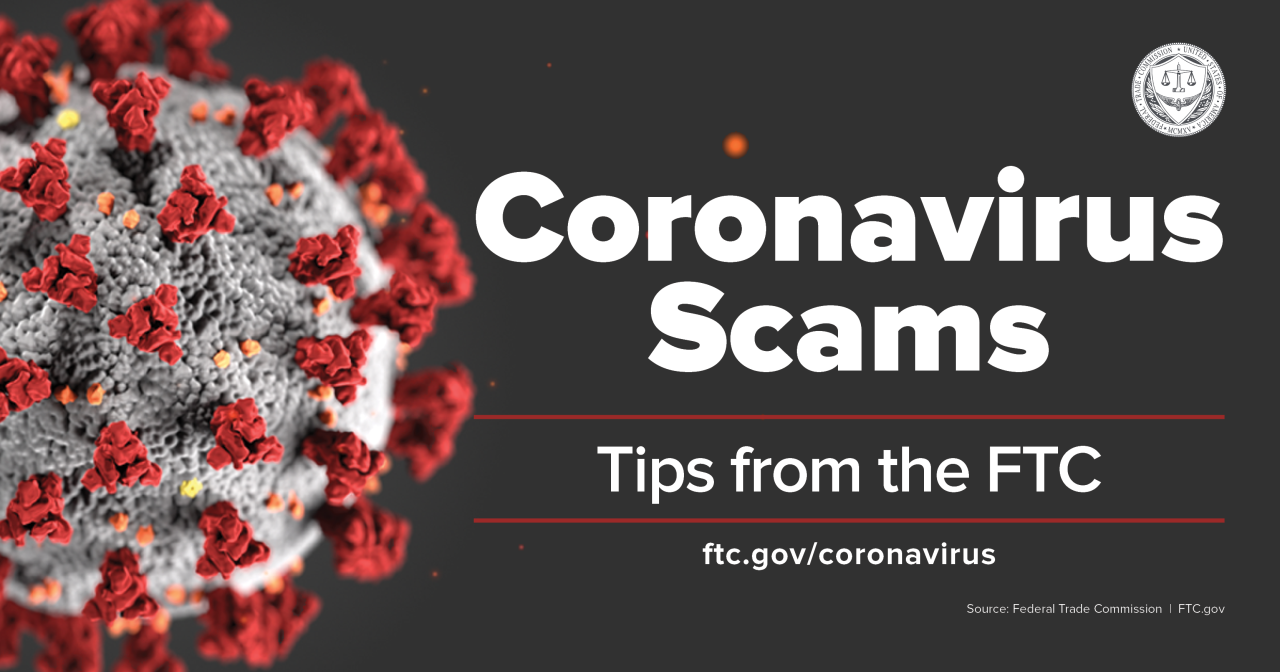
How to Report Coronavirus Fraud Scams
How to report coronavirus fraud scams is crucial in protecting yourself and others. This guide delves into identifying fraudulent schemes, understanding reporting mechanisms, and taking preventative measures. We’ll explore the various ways to report scams, from government agencies to online platforms, and provide a comprehensive checklist for recognizing and avoiding these potentially damaging situations. Learn how to safeguard your personal information and financial accounts, while also understanding the legal ramifications of fraud.
Coronavirus-related fraud can take many forms, from phishing emails to fake charities. Knowing the common red flags and how to verify information is key to staying safe. This comprehensive guide will help you recognize these scams and understand how to report them effectively. We’ll also cover how to protect yourself from future scams and understand the consequences of falling victim to these fraudulent activities.
Identifying Coronavirus Fraud Scams: How To Report Coronavirus Fraud Scams
Staying informed about coronavirus-related scams is crucial for protecting yourself and your loved ones. Fraudsters often exploit public anxieties and uncertainties surrounding health crises to deceive and steal. Understanding the tactics they employ is the first step in avoiding becoming a victim.Fraudulent schemes related to the coronavirus pandemic take many forms. They prey on fear and the need for information, often disguising themselves as legitimate sources of help or vital resources.
Recognizing these patterns can help you differentiate between legitimate health information and deceitful attempts to gain access to your personal information or finances.
Common Coronavirus Fraud Schemes
Knowing the different types of coronavirus-related scams will empower you to spot red flags and avoid falling victim. These scams range from seemingly harmless requests for information to outright attempts at financial exploitation.
- Fake COVID-19 cures or treatments: Fraudulent websites and individuals often peddle unproven or dangerous remedies for COVID-19. These scams exploit the public’s desire for a quick fix, promising cures or treatments that lack scientific backing.
- Fake vaccine information or registration scams: Fraudsters may create false information about COVID-19 vaccines, aiming to mislead people about their safety and efficacy. They may also create fake registration websites to harvest personal information.
- Phishing scams: These scams involve fraudulent emails, texts, or calls impersonating official health organizations or government agencies. They aim to trick you into revealing personal information, such as usernames, passwords, or bank details.
- Charity scams: During crises, legitimate charities often increase their efforts. However, fraudsters may impersonate reputable organizations, soliciting donations for nonexistent causes.
- Fake testing scams: Scammers may offer COVID-19 testing services at inflated prices or under false pretenses. They often take advantage of the increased demand for testing during outbreaks.
Distinguishing Fraudulent Activities from Legitimate Health Information
Reliable health information should be backed by scientific evidence and come from trustworthy sources. Beware of vague or sensational claims, particularly those lacking scientific support.
Further details about cima ethics confidentiality rules is accessible to provide you additional insights.
- Source verification: Always cross-reference information from any source, especially online, with official health websites or trusted medical professionals. Be skeptical of unusual websites or emails.
- Fact-checking: If something sounds too good to be true, it probably is. Verify information with trusted sources and official government health agencies.
- Request for personal information: Legitimate health organizations will not ask for sensitive personal information (such as bank details) unless it’s absolutely necessary and in accordance with privacy regulations.
- Demand for immediate action: Genuine health organizations typically do not pressure you into making decisions quickly. Scammers often use urgency to manipulate you into acting without thinking.
Identifying Red Flags in Coronavirus-Related Fraud
The table below Artikels common characteristics of fraudulent activities, helping you differentiate them from legitimate health information.
| Scam Type | Typical Approach | Examples of Red Flags |
|---|---|---|
| Fake Cure/Treatment | Promoting unproven remedies or treatments. | Vague claims, lack of scientific evidence, high price for the treatment, promises of quick cures. |
| Phishing Scam | Impersonating official organizations via email or phone. | Suspicious email addresses, grammatical errors, urgent requests for personal information, links to unfamiliar websites. |
| Charity Scam | Soliciting donations for non-existent or illegitimate causes. | Unfamiliar charities, vague descriptions of the cause, lack of transparency about how donations will be used, high-pressure tactics. |
| Fake Testing Scam | Offering COVID-19 testing services at inflated prices. | High prices, unclear testing procedures, requests for payment before the test, unverified testing facilities. |
Reporting Mechanisms
Staying vigilant against coronavirus fraud requires knowing how to report suspected scams. This involves more than just recognizing the tactics; it necessitates a structured process for escalating concerns to the appropriate authorities. Understanding the various reporting channels and procedures is crucial for effectively combating these fraudulent activities.
Government Agencies
Government agencies play a vital role in combating fraud, especially during a public health crisis. These bodies often possess resources and expertise to investigate and prosecute these crimes. They can also issue public warnings and guidance to prevent future incidents.
- The Federal Trade Commission (FTC) is a primary agency for consumer protection in the United States. They maintain a robust online reporting system where individuals can file complaints about fraudulent activities, including those related to COVID-19. The FTC’s website provides detailed instructions on how to file a complaint, including specific information needed, like the name of the scammer, the amount of money lost, and the dates of contact.
- The Centers for Disease Control and Prevention (CDC) handles public health concerns. While not directly focused on fraud, the CDC may provide information about scams if they pose a significant public health risk. Reporting suspicious information about products or services related to COVID-19 to the CDC is crucial for public health safety.
Consumer Protection Bureaus
State and local consumer protection bureaus are essential for investigating and addressing fraud within their jurisdictions. They often have specific procedures and resources to aid consumers.
- Each state has its own consumer protection agency. These agencies are often responsible for handling consumer complaints, including those related to COVID-19-related fraud. Their websites often have complaint forms or instructions on how to report suspected scams.
Online Platforms
Online platforms, including social media and e-commerce sites, are increasingly vulnerable to fraudulent activity. These platforms often have mechanisms for reporting such issues.
- Social media platforms (e.g., Facebook, Twitter) often have built-in reporting tools for scams. Users can report posts, ads, or messages that seem fraudulent. This is a key avenue to prevent the spread of fraudulent information.
- E-commerce sites (e.g., Amazon, eBay) have their own systems for reporting fraudulent listings or sellers. Consumers can report suspicious products, vendors, or transactions through these sites.
Reporting Procedure Comparison
A clear understanding of the various reporting procedures helps ensure the appropriate channels are utilized. This ensures the most efficient handling of complaints and the highest likelihood of success in combating the fraud.
| Reporting Body | Contact Information/Website | Filing Process |
|---|---|---|
| Federal Trade Commission (FTC) | ftc.gov | Online complaint form, or by phone. Specific information required (e.g., dates, amounts) |
| Centers for Disease Control and Prevention (CDC) | cdc.gov | Contact via website or dedicated fraud reporting line. Provide details about the fraud. |
| State Consumer Protection Agency (Example: California Department of Consumer Affairs) | Specific state website | Follow state-specific procedures for reporting consumer fraud. This often involves a dedicated online form or phone number. |
| Social Media Platforms | Platform-specific websites/apps | Use platform-specific reporting tools. Follow steps Artikeld by each platform. |
| E-commerce Sites | Site-specific support or reporting links | Use website’s customer support or reporting mechanisms. Follow site instructions. |
Protecting Yourself from Scams

Staying safe during a pandemic requires vigilance, especially when dealing with online information. Coronavirus-related fraud is unfortunately very common, and victims can lose significant amounts of money or personal information. Taking proactive steps to protect yourself is crucial.Understanding the tactics employed by fraudsters and being aware of red flags can help you avoid becoming a victim. This includes recognizing the methods used to spread misinformation and scams, and knowing how to verify the authenticity of information.
Developing a healthy dose of skepticism and critical thinking skills will help you spot potentially fraudulent requests or communications.
Steps to Avoid Falling Victim
Taking preventative measures can significantly reduce your risk of falling prey to scams. This involves a multi-faceted approach focusing on cautious behavior and verification.
- Verify the source of all health-related information. Don’t rely solely on social media posts or emails. Consult official government websites, reputable medical organizations, and trusted news sources for accurate information. This helps avoid misinformation and false claims that often accompany scams.
- Be wary of unsolicited emails, text messages, or phone calls offering cures, treatments, or financial assistance related to COVID-19. Scammers often use urgency and fear to manipulate victims. If you receive a suspicious message, contact official channels for verification.
- Never share personal information, such as bank account details or social security numbers, with unknown individuals or organizations. This includes links in emails or messages. Legitimate organizations will never ask for sensitive data via unsolicited communication.
- Check for spelling and grammatical errors in emails or messages. Scammers often use poorly written materials as a way to appear less professional and credible. Official communications are typically well-written and professionally formatted.
- Report any suspicious emails or messages to the relevant authorities. This helps in identifying and preventing future scams and informs the proper authorities of any attempts to defraud.
Verifying Online Health Information
Determining the authenticity of online information is crucial in avoiding scams. Developing a method for evaluating sources and content is essential.
- Look for official logos and branding from recognized health organizations or government agencies. A reliable source should have a clear and verifiable identity. Official websites usually include details of the organization, contact information, and clear legal and ethical statements.
- Examine the website’s URL carefully. Look for secure connections (indicated by “https” in the address bar) and verify the domain’s ownership and registration. Fake websites often use similar names to legitimate organizations.
- Research the author or organization behind the information. A reputable source should have a proven history of providing accurate and up-to-date health information. Check for credentials and background information.
- Compare the information with other trusted sources. If the information conflicts with what other reliable sources are reporting, it’s likely inaccurate or misleading. This cross-referencing helps determine the validity of the source.
Critical Thinking and Suspicious Communication
Developing critical thinking skills is a fundamental aspect of preventing scams. Learning to evaluate communications is an important skill.
- Question the urgency of the message. Scammers often create a sense of urgency to pressure victims into making quick decisions. Take time to assess the situation and consult reliable sources.
- Be cautious of promises of quick cures or miraculous treatments. Any health claim that sounds too good to be true likely is. Thorough research is needed before accepting any claims.
- Evaluate the sender’s credibility. Be aware of unfamiliar sources or organizations that may not be well-known in the health community.
- Contact the organization or individual directly to verify any request for personal information or financial transactions. Never reply to or click on suspicious links or attachments.
Examples of Phishing Attempts
Phishing attempts often target vulnerabilities and capitalize on fear or a sense of urgency.
| Type | Example | Description |
|---|---|---|
| An email claiming to be from a health organization offering a COVID-19 vaccine at a discounted price. The email contains a link to a fraudulent website. | The email attempts to trick the recipient into providing personal information for a fake vaccine offer. | |
| Text Message | A text message claiming a recipient has won a prize related to COVID-19 relief and asking for personal details to claim it. | The text message aims to gain personal information by falsely promising a prize. |
Warning Signs
Recognizing warning signs when dealing with unfamiliar sources is essential.
- Unusual requests for personal information.
- Sense of urgency or pressure to act quickly.
- Poor grammar or spelling in the communication.
- Unfamiliar sender or organization.
- Promises of free or heavily discounted services or products.
Steps to Take When You Suspect Fraud

Coronavirus fraud scams are unfortunately a persistent threat. Knowing what to do when you suspect a scam is crucial to protecting yourself and your finances. This section Artikels immediate actions, reporting procedures, and vital documentation strategies.Suspicious communications often prey on anxieties and urgency, making it essential to maintain a cautious and skeptical approach. Taking the time to thoroughly evaluate any request or communication is a crucial first step in avoiding financial loss and personal data breaches.
Immediate Actions Upon Suspicion
Understanding the immediate steps to take when you suspect a fraudulent communication is vital. This allows for rapid action to mitigate potential harm. Immediately do not engage with the communication, and instead, proceed to assess and document the suspected fraud.
Reporting a Suspected Scam
A structured reporting procedure ensures that fraudulent activities are documented and addressed effectively. A systematic approach helps authorities identify patterns and take necessary actions to stop scams. Report the suspicious activity to the relevant authorities, including the police or your financial institution.
Importance of Documentation
Thorough documentation is crucial for reporting suspected scams effectively. Detailed records provide evidence to support your claim and aid investigators in tracing the source of the fraudulent activity. This includes noting the date, time, and specific details of the communication, including any attachments or links.
Safeguarding Personal Information and Financial Accounts
Protecting personal information and financial accounts is paramount. Maintaining vigilance against phishing and other online scams is essential to safeguard sensitive data. Never share personal or financial information in response to unsolicited requests, and regularly review your account statements for any unauthorized activity.
Evidence Collection Procedure
Collecting evidence is essential for documenting a suspected scam. This helps ensure that the information is accurate and reliable for reporting purposes.
| Type of Evidence | Description | Importance |
|---|---|---|
| Emails | Capture the full email thread, including subject lines, sender information, and any attachments. | Emails provide crucial context and details about the communication. |
| Texts | Save the entire text conversation, including timestamps. | Text messages provide a chronological record of the communication. |
| Screenshots | Capture screenshots of suspicious websites, emails, or text messages. Include relevant details in the screenshot, like dates and times. | Screenshots provide visual proof of the scam attempt. |
| Copies of documents | Make copies of any documents related to the scam, such as invoices or forms. | Documents provide tangible evidence of the fraud. |
| Logs/Records | Retrieve transaction logs, account statements, and other relevant records from financial institutions or online platforms. | These logs provide detailed records of transactions and account activities. |
Preventing Future Scams

Staying vigilant against coronavirus-related scams requires a proactive approach. We’ve all seen how quickly misinformation and fraudulent schemes can spread, especially during times of uncertainty. By arming ourselves with knowledge and adopting healthy skepticism, we can significantly reduce our vulnerability to these harmful tactics.
Recognizing Red Flags, How to report coronavirus fraud scams
Spotting potential scams is crucial. Look for inconsistencies, urgency, and unrealistic promises. Be wary of emails, texts, or calls that pressure you to act quickly. A genuine request for information will rarely demand immediate action. Phishing emails often contain poor grammar, misspelled words, or generic greetings.
If something feels too good to be true, it likely is. Be especially cautious of offers for quick cures or miracle treatments for COVID-19.
Educating Yourself and Others
Educating yourself and your loved ones about fraud prevention strategies is essential. Share this information with family, friends, and colleagues. Explain the importance of verifying information from reputable sources. Knowledge empowers individuals to make informed decisions and avoid falling victim to scams. This collective awareness is vital in creating a more secure environment for everyone.
Reliable Sources of Information
Staying informed from credible sources is paramount to navigating the ever-evolving landscape of coronavirus-related information. Avoid social media posts and unverified websites. Instead, turn to trusted organizations for accurate health advice. Reliable sources will provide balanced information, backed by scientific evidence.
Reputable Organizations for Reliable Information
| Organization | Focus/Expertise |
|---|---|
| Centers for Disease Control and Prevention (CDC) | Public health information, guidelines, and research on diseases. |
| World Health Organization (WHO) | Global health agency providing information and recommendations. |
| National Institutes of Health (NIH) | Medical research and information on various health conditions. |
| Local Health Departments | Community-specific information and resources for local residents. |
| Government Websites (e.g., your country’s official website) | Official announcements and guidelines from the government. |
Consequences of Coronavirus Fraud
The devastating impact of coronavirus fraud extends far beyond mere financial loss. It can erode trust, damage reputations, and inflict emotional distress on victims. Understanding the multifaceted consequences is crucial to recognizing the gravity of these crimes and fostering a proactive approach to prevention.The ripple effects of coronavirus fraud can be deeply personal, affecting individuals and families in various ways.
Victims may experience a profound sense of betrayal and vulnerability, leading to feelings of anxiety, fear, and depression. The stress of navigating the complex process of recovering from fraud can also lead to health problems.
Financial Consequences of Coronavirus Fraud
The financial fallout from coronavirus fraud can be significant and long-lasting. Victims may lose hard-earned savings, investments, or other assets. These losses can create financial hardship, making it difficult to meet basic needs such as housing, food, and healthcare.
- Loss of savings and investments: Fraudsters often target individuals seeking financial relief or opportunities related to COVID-19. Fake investment schemes promising high returns, or fraudulent loan applications, can result in significant losses of savings and investments, potentially jeopardizing future financial stability.
- Identity theft: Fraudulent schemes often involve the collection of personal information, including Social Security numbers, bank account details, and credit card information. This information can be used to open fraudulent accounts, apply for loans, or make unauthorized purchases, leading to a long and arduous process of recovering identity.
- Increased debt: Victims may incur significant debt as a result of fraudulent activities. Unauthorized charges on credit cards or loans can lead to substantial financial burdens, making it difficult to repay the debt and recover from the fraud.
Emotional Consequences of Coronavirus Fraud
The emotional toll of coronavirus fraud can be just as devastating as the financial impact. Victims may experience feelings of anger, betrayal, and frustration. These negative emotions can lead to a variety of psychological and emotional issues.
- Loss of trust: Fraud can erode trust in institutions and individuals. Victims may struggle to trust others or feel skeptical of legitimate offers or opportunities, impacting personal relationships and financial decisions.
- Anxiety and stress: The process of dealing with fraud can be extremely stressful. Victims may experience anxiety, worry, and difficulty sleeping due to the uncertainty and challenges associated with the fraud. The worry and concern can lead to further health problems.
- Depression: The financial and emotional distress caused by fraud can contribute to feelings of hopelessness and despair. In severe cases, this can lead to depression, requiring professional support and intervention.
Legal Ramifications of Coronavirus Fraud
Participating in or perpetrating coronavirus fraud carries significant legal consequences. Authorities actively investigate and prosecute individuals involved in these crimes.
- Criminal charges: Depending on the nature and severity of the fraud, perpetrators may face criminal charges, including felony offenses. These charges can lead to imprisonment and significant fines, potentially impacting their future opportunities and well-being.
- Civil lawsuits: Victims may file civil lawsuits against perpetrators to recover their losses. These lawsuits can result in financial penalties and restitution for the victim.
- Reputation damage: Individuals involved in fraud can face significant reputational damage, making it difficult to maintain professional or personal relationships. This damage can persist long after any legal proceedings are completed.
Final Summary
Navigating the complex world of coronavirus fraud requires vigilance and knowledge. This guide provides a roadmap for identifying, reporting, and preventing these scams. By understanding the different reporting mechanisms, protecting yourself from fraudulent activities, and understanding the potential consequences, you can proactively safeguard yourself and your loved ones. Remember to stay informed, be cautious, and report any suspicious activity.
